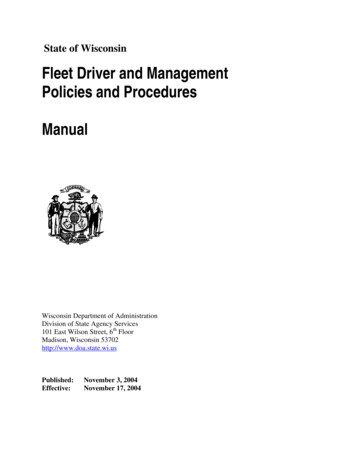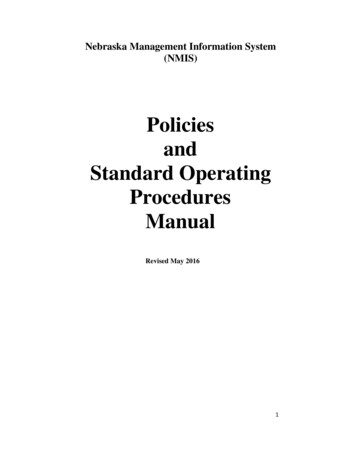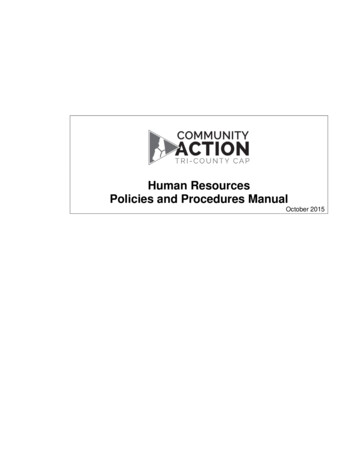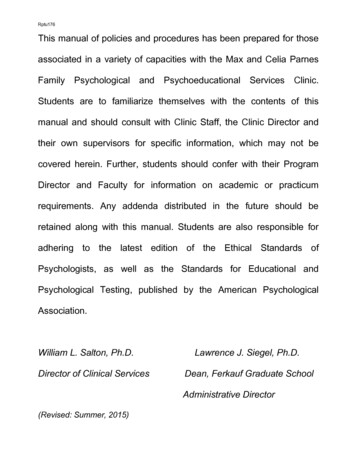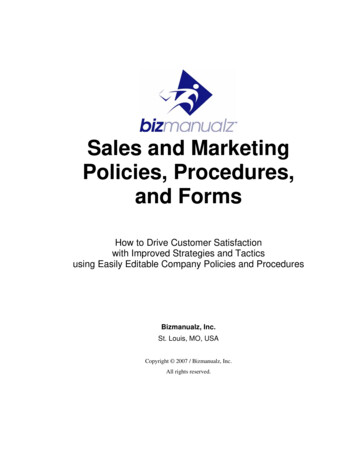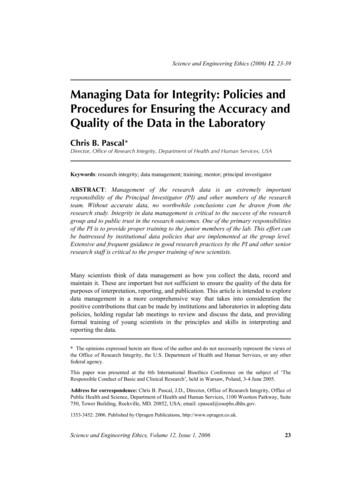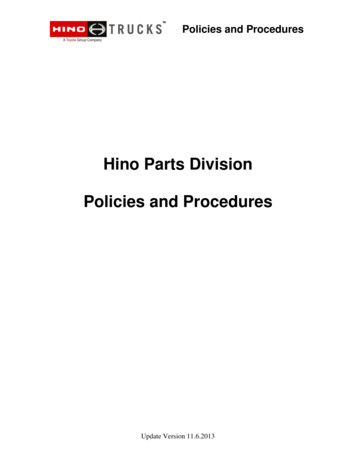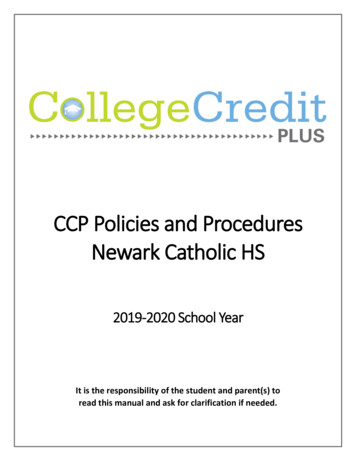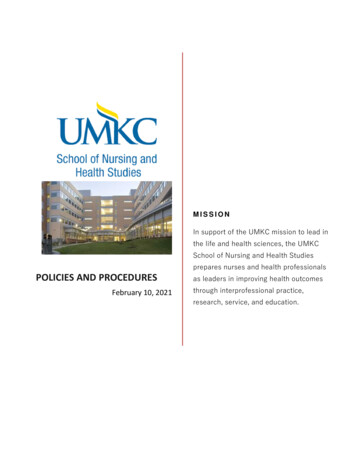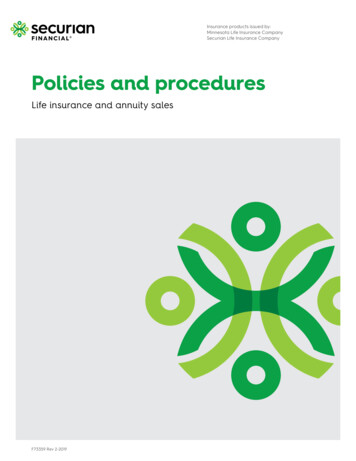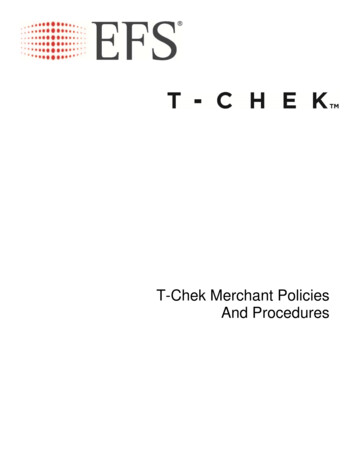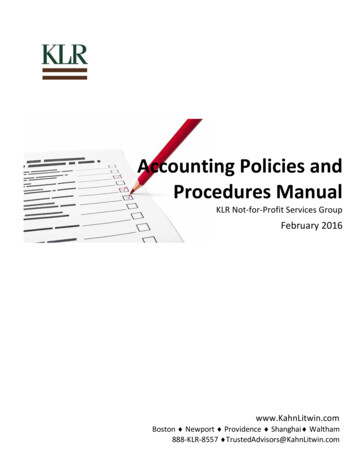
Transcription
Accounting Policies andProcedures ManualKLR Not-for-Profit Services GroupFebruary 2016www.KahnLitwin.comBoston Newport Providence Shanghai Waltham888-KLR-8557 TrustedAdvisors@KahnLitwin.com
Accounting Policies and Procedures Manual PrefaceThis manual has been assembled to provide ORGANIZATION NAME ("ORGANIZATIONNAME") with guidance in fulfilling its fiscal responsibility to its funding sources.The Accounting Policies and Procedures Manual establishes ORGANIZATION NAME'spolicies in various financial-related areas and sets forth the procedures to be followed in adhering tothose policies. This manual is to be used by ORGANIZATION NAME and its employees to assurethat ORGANIZATION NAME's financial resources are properly safeguarded and utilized only forauthorized purposes.Management realizes that the procedures set forth in this manual may become inadequate because ofchanges in conditions. As such, Management, as authorized by the Board of Directors will revise,modify, and update this manual as conditions warrant.ORGANIZATION NAME will follow the established policies and procedures in fulfilling its fiscalresponsibility and in maintaining its accountability to its funding sources.2
Table of 38General Statement on Accounting SystemInternal ControlFinancial Statement AuditFinancial ReportsBudget Development, Overview and ResponsibilityCash ManagementInvestmentsPetty CashAccounts Receivable CollectionProcurement StandardsReceivingAccounts PayableCash ReceiptsCash DisbursementsPayrollPayroll TaxesProperty ManagementTravel and Entertainment ExpensesLeased VehiclesEmployee Expenses and AdvancesRelated Party TransactionsRecord RetentionPersonnel Files3
Policy Number 1 - General Statement on Accounting Policies and ProceduresPolicy:1.ORGANIZATION NAME shall maintain its accounting records in conformity withgenerally accepted accounting principles.2.Fund accounting - In order to ensure observance of limitations and restrictions placedon the use of resources available to ORGANIZATION NAME, the accounts ofORGANIZATION NAME are maintained in accordance with the principles of "fundaccounting". Resources to be used for specific purposes are classified for accountingand reporting purposes into funds that are in accordance with activities specified.Fund balances restricted by outside sources are distinguished from unrestricted funds.Externally restricted funds may only be utilized in accordance with the purposesestablished by the source of such funds. Unrestricted funds represent those fundsover which the Board of Directors retains full control in achieving any ofORGANIZATION NAME's purposes.3.Government grants - Government grants are recognized as revenue byORGANIZATION NAME according to the guidelines of Financial AccountingStandards Statement Number 116.4.The policies and procedures set forth in this manual will be followed byORGANIZATION NAME in carrying out its daily operations. Variances will beallowed only when approved by the Director. If a grant funding source requires morestringent policies and procedures, the funding sources' policies and procedures shall befollowed.Procedures:1.Accounting records will be maintained in accordancewith ORGANIZATION NAME's fiscal year, ie. January 1-December 31.2.The double-entry method of bookkeeping and the accrual method of accounting shallbe used.3.ORGANIZATION NAME's computer system will be utilized in maintaining andcreating the general ledger, all related journals and financial reports.4.All revenues, support and expenses shall be segregated by Fund programs, grants, etc.to provide for a proper accounting of each program/grant by source of funds.5.ORGANIZATION NAME's financial statements will be audited by an independentcertified public accounting firm on an annual basis in accordance with generallyaccepted auditing standards and Government Auditing Standards, issued by theComptroller General of the United States. The audit shall also satisfy the auditrequirements set forth in the Office of Management and Budget (OMB) Circular No.A-133.4
Policy Number 2 - Internal ControlPolicy:ORGANIZATION NAME will maintain an adequate system of internal accountingcontrols to provide management with reasonable assurance as to the safeguarding ofassets against losses from unauthorized use or disposition and the reliability offinancial records for preparing financial statements and maintaining accountability ofassets.Procedures:1.2.The characteristics of an adequate system of internal control will include the following:a.)Segregation of duties, when possible, within the organization based onfunctional responsibilities.b.)A system of authorization and record retention.c.)A degree of personnel competence commensurate with responsibilities.To achieve these objectives, the following controls will be in place:a.)No one person shall have complete control over all phases of any significanttransaction.b.)Whenever possible, the flow of work will be from one employee to another sothat the work of the second, without duplicating that of the first, provides acheck upon it.c.)Recordkeeping will be separated from operations or the handling and custodyof assets.d.)Responsibilities in the accounting department will be clearly established andfollowed as closely as possible5
Policy Number 3 - Financial Statement AuditPolicy:ORGANIZATION NAME will have its financial statements audited by anindependent Certified Public Accounting firm on an annual basis.Procedures:1.ORGANIZATION NAME will have its financial statements audited annually inaccordance with generally accepted auditing standards, and Government AuditingStandards, issued by the Comptroller General of the United States, 1988 Revision.2.If applicable, ORGANIZATION NAME's audit shall also comply with the auditingrequirements mandated by OMB Circular A-133.3.In preparing for the audit, ORGANIZATION NAME should complete a self-checkaudit program.4.Copies of the audited financial statements will be distributed to the Director,Accounting Manager and/or Bookkeeper and others at the discretion ofORGANIZATION NAME's Director. Additional copies will also be distributed tothe Board of Directors.6
Policy Number 4 - Financial ReportsPolicy:l.All monthly, internal financial reports will be completed and distributed toORGANIZATION NAME's Director and Board of Trustees by the 15th day of thefollowing month.2.All financial reports required by a grant funding source will be properly prepared andfiled in accordance with the applicable laws and regulations.Procedures:1.The monthly, internal financial reports consist of the following:a.)b.)c.)d.)e.)f.)Trial Balance,Balance Sheet,Statement of Support, Revenues and Expenses,Budget Variance Reports,Aged Accounts (participation fees) Receivable Report, and anAged Accounts Payable Report, if applicable.2.ORGANIZATION NAME's external reporting requirements as set forth in the termsand conditions of grants shall be adhered to.3.In order to satisfy these reporting requirements, ORGANIZATION NAME shall setup and utilize a report tickler file. The tickler file will identify the funding source, typeof report, due date and date filed.7
Policy Number 5 - Budget Development, Overview and ResponsibilityPolicy:1.ORGANIZATION NAME will develop and utilize a budgeting process to monitorORGANIZATION NAME's financial assets and resources.2.Budgets will be prepared annually and submitted to the Board of Directors forapproval following review and recommendation by the Finance Committee.3.The Director, in conjunction with the Accounting Manager, will be responsible for theoversight of the budget(s) throughout the year.4.Monthly budget variance reports will be completed and distributed to the Director,department heads and/or project directors, and the Board of Directors by the 15th dayof the following month.Procedures:1.Annually, the department heads and/or project directors for each program/grant areresponsible for developing a budget for the next fiscal year.2.The Accounting Manager will assist the department heads and/or project directors byproviding cost factor information and information on past budget performance. TheAccounting Manager will also review the budget requests for reasonableness,allowability and cohesiveness within ORGANIZATION NAME.3.The Accounting Manager will submit the budget to the Director. The Director willreview, adjust and otherwise confirm the budgets in consultation with each departmenthead and/or project directors and the Accounting Manager.4.The Director submits the budget to the Board of Directors through the FinanceCommittee.5.The Board reviews, adjusts as appropriate and confirms ORGANIZATION NAME'sbudget for the next fiscal year.6.Budgets for grant-funded programs are developed by the Director, department headsand/or project directors, and Accounting Manager in conjunction with grant fundingsources. These budgets will be reviewed by the Co-Chairmen, and submitted to theBoard of Directors as part of the annual budget process described above.7.Department heads and/or project directors must operate within the budget guidelinesand dollar amounts approved for each fiscal year.8.Department heads and/or project directors will receive a Budget vs. Actual (budgetvariance) report on a monthly basis.8
9.Department heads and/or project directors are responsible for managing the fundsallocated in their budgets and will be required to justify all budget overruns.10.The Director, in conjunction with the Accounting Manager, will oversee actual costsand expense allocations throughout the year to ensure adherence to budget(s).11.New initiatives, cost overruns, etc. identified during the year are to be brought to theattention of the Director. Review efforts should identify either proposed revenue(support) coverage for these costs or budget re-allocation opportunities.12.The Director will inform the Board through the Finance Committee or the CoChairmen of the proposed budget revisions and seek their approval. The Board or theCo-Chairmen, at any time, may adjust ORGANIZATION NAME's budget at itsdiscretion to reflect Board initiatives or new conditions.13.Budget revisions for Federally funded projects will be made in accordance with theapplicable federal regulations and requirements.9
Policy Number 6 - Cash ManagementPolicy:1.ORGANIZATION NAME will properly control and account for allcash.2.In accordance with 45 CFR Part 74.61 (e) regarding advanced payments, "Proceduresshall be established to minimize the time elapsing between the advance of Federalgrant or subgrant funds and their disbursement by the recipient. When advances aremade by a letter-of-credit method, the recipient shall make drawdowns as close aspossible to the time of making disbursements."3.All cash depository accounts will have FDIC coverage.4.All bank balances in excess of FDIC coverage ( 100,000) will be collaterally secured.Procedures:1.All bank accounts shall be in ORGANIZATION NAME's name.2.All checks will be pre-numbered and used in numerical order.3.No checks will be prepared without proper supporting documentation.4.Checks will not be made payable to "Cash" or "Bearer".5.Blank checks are to be kept in a secured location in the Accounting Manager's office.6.All checks must be accounted for. Void checks are to be defaced and kept forsubsequent inspection.7.All bank accounts will be reconciled monthly by the Accounting Manager and/orAccounting Clerk, and reviewed by the Director.8.The Accounting Manager will compare the reconciled cash balances to the GeneralLedger balances and investigate and resolve all variances.9.The authorized check signatures are as follows:a.)b.)c.)10.DirectorCo-Chairman of Board of Directorsall other TrusteesFor disbursements 2,000 and recurring monthly payments including rent, autoleases, federal tax deposits, payroll, health insurance and pension, the Director can signalone.10
11.For disbursements 2,000 (except for those noted above), two authorized signaturesare required. Both signatures must be of Directors, preferably the Co-Chairmen.12.The mechanical check signer, if applicable, will be kept in a locked file cabinet separatefrom the blank checks.11
Policy Number 7 - InvestmentsPolicy: All investments of ORGANIZATION NAME shall be in ORGANIZATION NAME's nameand recorded in conformity with generally accepted accounting principles.Procedures:l.ORGANIZATION NAME's investment portfolio will be diversified and managed byprofessional investment advisors selected by the Board of Directors in order tomaximize return on investment and minimize the risk of any serious losses.2.The Director and Board of Directors will be responsible for the periodic review of theportfolio in order to maximize ORGANIZATION NAME's return and avoid anypotential loss.3.All security instruments (stocks, bonds, etc.) shall be maintained by the custodianappointed by the Board of Directors.4.Each month the investment portfolio reports received from the investment advisorswill be reconciled to the general ledger by the Accounting Manager.12
Policy Number 8 - Petty CashPolicy: ORGANIZATION NAME shall maintain a petty cash account on an imprest basis in theamount of 150.00.Procedures:1.The Accounting Manager will be the custodian of the imprest petty cash funds.2.All petty cash funds will be kept in a petty cash box in a locked drawer or file cabinet.Only the petty cash custodian and the Director or Office Manager will have access tothe petty cash box.3.Disbursements of 50.00 or less may be made from the petty cash fund formiscellaneous supplies and expenses.4.The purchaser shall present the petty cash slip to the petty cash custodian for payment.A receipt for all purchases must be attached to the petty cash slip.5.The petty cash custodian shall insure that the petty cash slip is properly completed,approved, and that a proper
2. The Accounting Manager will assist the department heads and/or project directors by providing cost factor information and information on past budget performance. The Accounting Manager will also review the budget requests for reasonableness, allowability and cohesiveness within ORGANIZATION NAME. 3. The Accounting Manager will submit the budget to the Director. The Director will
